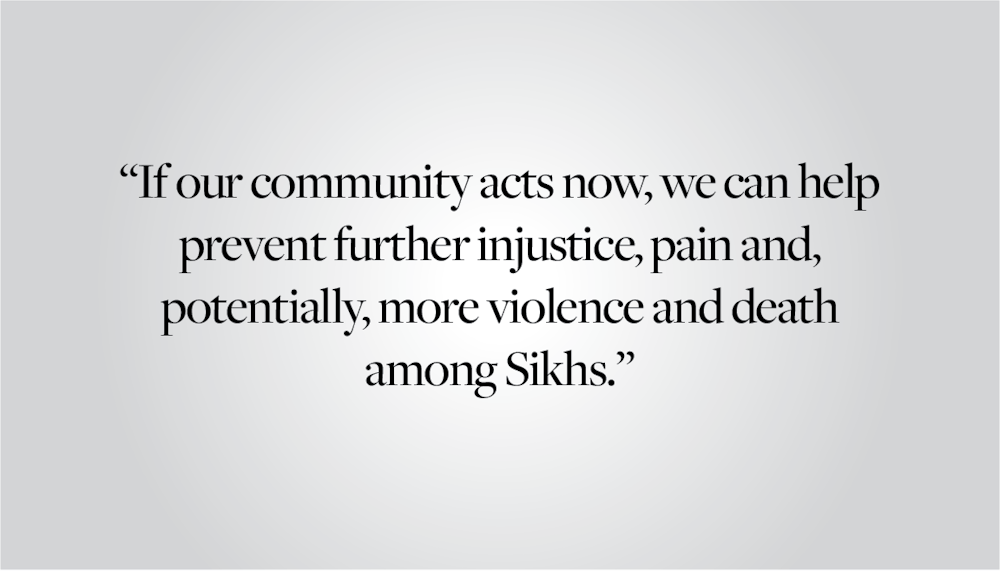We have, as a global community, witnessed many recent acts of human rights violations across the world. As horrifying as these events are and as depressing the news can sometimes feel, the united global responses against these atrocities often lead to some positive change. Extensive humanitarian aid, political and economic sanctions and NGO support can all partially result from people simply talking about what is happening and why it is wrong. Considering the current horrid crackdown on Sikhs in Punjab, India, it begs the question: Why aren’t we all talking about Punjab? Or, perhaps more importantly, why aren’t we hearing about Punjab?
If you are not aware, Punjab is a region of India where the largest population of Sikhs in the world lives. The region is no stranger to the violent oppression of the Sikhs — the most notable example being the 1984 genocide which saw the Indian government attack a significant theo-political center for Sikhs and massacre thousands, with further massacres continuing throughout the year in different cities (the mass graves of which have been found as recently as 2011). Many of the people involved in these atrocities have yet to face justice, and, now, in 2023, these same old patterns of violent oppression are rearing their head again.
On March 18, the Indian government began a police crackdown on Punjab in attempts to locate Amritpal Singh, a leading member of the Sikh separatist movement in Punjab. This crackdown has seen thousands of paramilitary forces deployed, the arrests of hundreds of people and the shutdown of internet services across the region — effectively keeping almost 30 million people offline. There have also been specific attacks on the freedoms of journalists, lawyers and activists with little to no connection to the events, as the government has blocked their social media accounts, raided their homes and even arrested some. Furthermore, the Indian government has requested that Twitter block over 100 accounts, many of which are run by influential people outside of Punjab simply trying to spread awareness of the unjust crackdown. Among others, the list includes Canadian politicians, poet Rupi Kaur and a UN-affiliated human rights NGO. This denial of internet access amidst the arrests of journalists and protestors poses a terrifying threat to the free speech and individual freedoms of the people of Punjab, but it also harkens back to the conditions that allowed for the 1984 genocide. Even to a skeptic, the combination of media blackouts, increased police presence and unjustified arrests of anyone the government deems a potential threat should ring alarm bells. This is the potential groundwork for yet another horrifying act of violent oppression of Sikhs. So, why aren’t we hearing or talking about Punjab? Because the people of Punjab have been silenced.
Regardless of how you view Singh, his rhetoric or his supporters, this crackdown has transcended him as a sole target: It affects the largest Sikh population in the world, who are being unfairly and disproportionately oppressed by the Indian government under the guise of finding one man. This cannot continue. This cannot be justified.
But what does this have to do with us here at Brown? It is extremely easy to decide that this issue is too far removed from us and our daily lives to warrant any real response or conversation amongst the Brown community outside of directly impacted community members. But this perspective is misguided for several reasons. First, there are students here at Brown who are Sikh and have parents who survived the 1984 genocide, so this does directly affect our community. Secondly, media blackouts in Punjab and the online restriction of global figures represent one of the primary ways the Indian government has continued its oppression of Sikhs. Many of the people directly experiencing this injustice have been forced into silence. Thus, it falls to those of us with the ability to speak out and raise awareness about these heinous actions to do just that. The Brown Sikh Student Association has been working to do this, with support from several other South Asian student groups (including the Brown South Asian Students Association). However, considering the greatest weapon against this oppression from this distance is raising awareness, it is crucial that the greater Brown community supports them and helps spread the word.
One important event students can attend is coming up this Saturday: NESSA 2023 (New England Sikh Students Assembly). The event is open to all and will include informative speakers and panels representing schools all around New England. It’s the perfect opportunity to learn about Sikhi, the current crackdown and how to help and ask questions in a diverse and safe environment.
There’s a lot we can do individually as well. Doing your own research to become more informed about both the current events and the history of Sikh oppression is itself a good step, although it’s also important to acknowledge that much of the information available has been censored or twisted. What is especially important is having conversations about the crackdown with friends, colleagues, family, acquaintances — anyone, really.
You still may not care. You still might think there’s no point, that someone else more closely connected to the issue will do the work for you. But if you’ve ever felt silenced or ever come up against an institution that exploits its power over you, then you know just how important any outside help can be. If our community acts now, we can help prevent further injustice, pain and, potentially, more violence and death among Sikhs. It’s the least we can do not to ignore that power we have.
Paulie Malherbe ’26 can be reached at paulie_malherbe@brown.edu. Please send responses to this opinion to letters@browndailyherald.com and other op-eds to opinions@browndailyherald.com.





